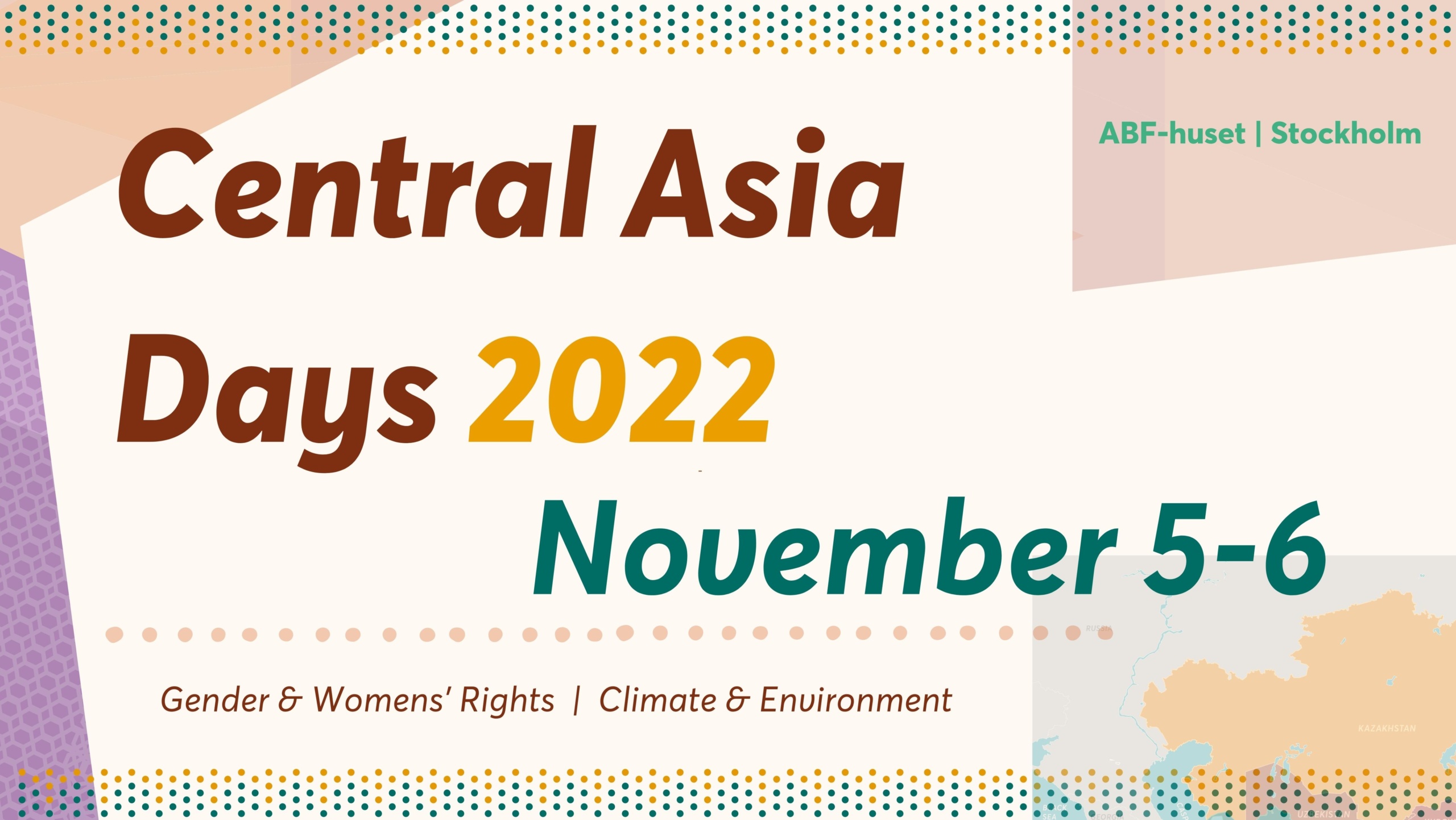On the weekend of 5-6th of November Centralasiengrupperna is hosting the yearly Central Asia Days conference in Stockholm!
During Central Asia Days 2022, we focus on two thematic areas: gender/women’s rights and climate/environment. Lectures and talks will be held in English by scholars and activists active in the region. On Saturday evening, there will be an additional movie screening at Zita Folkets Bio, Stockholm.
The event is free of charge.Register here: https://www.eventbrite.com/…/central-asia-days-2022…Venue: Per Albinsalen, ABF-huset, Sveavägen 41, Stockholm.
Full program:
DAY 1: Saturday 5TH OF NOVEMBER
THEME: Gender and Women’s rights
10.30-10.45: Welcome
10.45-11.45: Women’s participation in politics in Kazakhstan: Experiences from Feminist Initiative “Feminita”.
Zhanar Sekerbayeva
The feminist network Feminita, advocates for 50 percent of women in state affairs and high political positions. The Feminist March and Meeting in 2022, were both dedicated to womens’ participation in politics and state affairs. This session focuses on Feminita’s analysis and methods.
Zhanar Sekerbayeva is one of the co-founder of the Kazakhstan Feminist Initiative “Feminita”. She is a feminist, a powerlifter and a poet. In her works she aims at expanding the concept of gender in the general public discourse through activism by mainstreaming questions of gender identity in Academia and making Central Asia visible as a region.
13.00-14.00: Compulsory ‘feminine happiness’ and lesbian existence in Bishkek, Kyrgyzstan.
Mohira Suyarkulova
Her book A Book on Happiness for young (and not so young) LGBT (but not only) people was published last year in Russian (Bishkek, 2021) in collaboration with the co-authors Nina Bagdasarova and Georgy Mamedov. The book is based on several years of ethnographic research with LGBTQ+ people in Kyrgyzstan.
Dr. Mohira Suyarkulova is an Associate Professor in the Department of Psychology at the American University of Central Asia. Dr. Suyarkulova’s research interests include politics of gender, sexuality and nationalism in Central Asia, environmental politics, disability studies and happiness studies. She works on the intersection of academia, activism and art.
14.30-15.30: Fragile Peace: Situation of women in conflict affected environments in Central Asia.
Dildora Khamidova
What is the role of women and girls in conflict prevention? Central Asia is a multiethnic region and what challenges minority women face? What measures/ recommendations are suggested to improve the current situation of women and girls?
Dildora Khamidova is working for UN Women in the capacity of Head of UN Women sub office in Osh, Kyrgyzstan. For the last 20 years she has been actively engaged in regional initiatives to promote human rights with a focus on gender equality and minority rights in Central Asia. She graduated from Geneva Graduate Institute, Executive MA in Developing Practices and Policies and OSCE Academy in Political Science, Bishkek.
18.30: Movie Screening. “Baqyt” (Happiness) Kazakhstan, 2022
English subtitles, Zita Folkets Bio, Birger Jarlsgatan 37
DAY 2: Sunday 6TH OF NOVEMBER
THEME: Climate and environment
10.30-10.45: Introduction
10.45-11.45 11-12.00: Environment and climate resilience in Central Asia.
Gulzat Baialieva
How does climate change affect Central Asia as a region and what implications does climate change have on the environment and the people?
Gulzat Baialieva is a researcher at the department of Social Anthropology, University of Tübingen. She holds an MA degree in Political Science from the Central European University (Hungary), and a graduate diploma in European Civilizations from Bishkek Humanities University (Kyrgyzstan). Her research interests include environmental anthropology, digital ethnography, media and socio-political transformations in Central Asia.
12.45-13.45: Mining in Kyrgyzstan: Environmental and Human Rights Challenges.
Janyl Moldalieva
This session will focus on mining challenges in Kyrgyzstan, providing insights about its environmental and human rights implications. It will provide the state of play related to environmental management, especially mine tailings and governance frameworks. Drawing from the field research, it will present case studies about local mining communities in Kyrgyzstan.
Dr Janyl Moldalieva leads research and policy analysis on natural resource governance and sustainable development at the United Nations Environment Program. She serves as an expert on environmental monitoring and information and extractives industry at the Environmental Performance Review process led by the United Nations Economic Commission for Europe.
14.00-15.30: The future of farming in Kyrgyzstan: opportunities and challenges for sustainable agriculture – A case study of permaculture and organic farming initiatives.
Simone De Boer & Nuraiym Syrgak
In recent years, environmentally friendly forms of agriculture are gaining popularity in Kyrgyzstan. In this presentation we will provide insight into the environmental, sociocultural, economic and political context of this development and discuss some of the opportunities and challenges farmers and other actors experience while commencing with or transitioning to (more) sustainable agricultural practices. In particular, we will focus on organic agriculture and permaculture.
Simone de Boer is a PhD candidate in Social Anthropology at Gothenburg University. Her PhD research is focused on the development of sustainable agriculture and the making of ‘sustainable farmers’ in Kyrgyzstan. Before starting her PhD, she worked as a lecturer at the institute of Cultural Anthropology & Development Sociology at Leiden University, the Netherlands.
Nurayim Syrgak kyzy is an environmental activist. She works at the Foundation “El-Too” in Kyrgyzstan, specializing in biodiversity conservation, community microreserves, permaculture and ecotourism with a focus on women and youth. Over the last two years, El-Too in partnership with CAG have actively been introducing permaculture initiatives among farmers of Naryn and Issyk-Kul regions of Kyrgyzstan.

